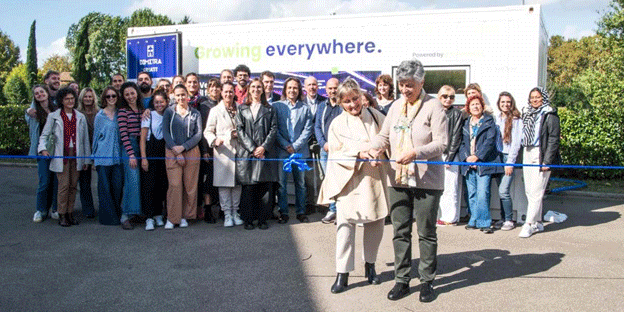On October 11th, the Institute of Plant Production at the Scuola Superiore Sant’Anna in San Giuliano Terme, Italy, inaugurated its new high cube isothermal container, a groundbreaking facility designed for the advanced study of diverse plant varieties. This initiative is part of the AGRITECH project, which aims to enhance research infrastructures and develop national R&D samples for key enabling technologies funded by the European Union under the NextGenerationEU initiative.
Advancements in Controlled Environment Agriculture
The high cube isothermal container represents a significant leap forward in vertical farming and controlled environment agriculture (CEA). With an internal volume of 25.13 cubic meters, the container has been meticulously designed and customized by Greatit srl, a company specializing in sustainable agriculture. It is equipped with a climate control system that can adjust temperatures from +5°C to +45°C and manage humidity levels between 60% and 90%.
This meticulous environmental control is crucial for scientific experimentation. The container’s anti-stratification system circulates air effectively to ensure uniform temperature and humidity conditions throughout the space, promoting optimal plant growth without directly affecting the crops. Additionally, a fertigation system allows for the simultaneous distribution of fertilizers through irrigation water, enhancing nutrient delivery to the plants.
Research Opportunities and Crop Experimentation
The newly launched facility is poised to facilitate extensive research into the responses of different vegetable and ornamental plant species to varying environmental conditions and cultivation practices. Researchers from the Institute will utilize the container to conduct hydroponic experiments, where crops are grown without soil. This method enables them to measure the effects of different salinity levels on seedling growth, crucial for developing resilient plant varieties that can thrive in challenging conditions.
Notably, the facility is equipped with custom shelving tailored for medium-sized plants, sensors for evaluating light quality, and an internal camera for monitoring growth. Furthermore, the container’s remote management capabilities via smartphone and tablet applications allow researchers to adjust conditions in real time, thereby enhancing the efficiency and accuracy of their experiments.
Implications for Future Vertical Farming
The development of this high-tech container comes at a time when vertical farming is gaining momentum as a solution to many challenges faced by traditional agriculture, such as land scarcity, climate change, and the need for sustainable food production systems. The ability to conduct controlled experiments on a range of plant varieties within a compact space can lead to significant advancements in crop yields and resilience.
As the global population continues to grow and urban areas expand, innovative approaches like those offered by the high cube isothermal container could play a vital role in addressing food security. By enabling the cultivation of high-quality produce in urban settings, vertical farms can reduce transportation emissions, ensure fresher food options, and utilize resources more efficiently.
The inauguration of the high cube isothermal container at the Scuola Superiore Sant’Anna marks a pivotal moment in the evolution of vertical farming and controlled environment agriculture. By providing researchers with a sophisticated facility to study various plant species under precisely controlled conditions, this initiative has the potential to drive significant advancements in sustainable agriculture practices. As innovations like these continue to emerge, they will be instrumental in meeting the challenges posed by a growing global population and changing climate.











